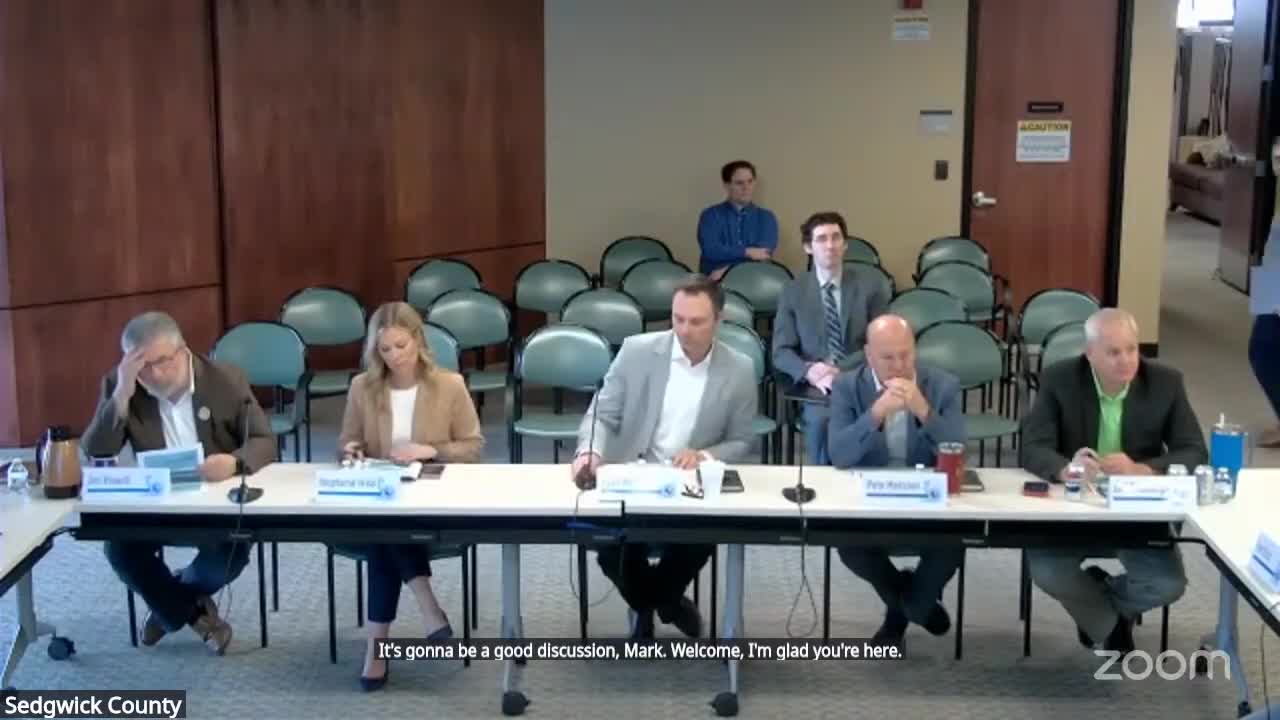Sedgwick County DA urges commissioners to pursue Axon system to manage surging digital discovery
Get AI-powered insights, summaries, and transcripts
Subscribe
Summary
District Attorney Mark Bennett told county leaders that growing volumes of video, phone and other digital evidence require new tools. He recommended a 10‑year Axon Justice Premier contract to speed transcription, redaction and storage; commissioners asked purchasing to vet terms and agreed to seek formal pricing and contract proposals.
District Attorney Mark Bennett told the Sedgwick County staff meeting that the county’s criminal justice system is being overwhelmed by rapidly growing digital evidence and urged the commission to pursue a 10‑year contract with Axon for its Axon Justice Premier suite.
Bennett framed the proposal as necessary to meet constitutional and statutory discovery obligations, citing U.S. Supreme Court precedent including Brady and Giglio, and an ethics standard that he said requires prosecutors to disclose potentially exculpatory material. “We literally have to give them everything that could help them,” Bennett said, and added that failures to disclose can lead to overturned cases or professional discipline.
Why it matters: Bennett said the office has moved from copying paper files to handling tens of terabytes of digital evidence. He cited roughly 48 terabytes currently handled this year and said the office expects to exceed 50 terabytes by year end; Axon, he added, is already hosting roughly 160 terabytes for the office under evidence.com. He warned that higher‑resolution cameras, drones and other new sources will continue to increase storage needs.
What Bennett proposed: Axon Justice Premier would combine transcription, searchable indexing and redaction tools with cloud storage. “Transcription and word search let Sam sit there and go, ‘I’m looking for dates of birth,’… find them, and then you can scrub that information in minutes rather than days or weeks,” Bennett said, describing the product as a way to reduce manual review time and forestall large increases in discovery staff.
Costs and procurement: Bennett said a preliminary figure for first‑year costs is $204,000 for the package he demonstrated; he told commissioners that longer‑term, recurring annual pricing had been discussed in a range (quoted in the presentation as about 2.4–2.6, units not specified in the transcript) and that he would obtain firm, itemized pricing from Axon. He compared three storage options — the county’s new records management system, building county‑hosted servers, or the vendor package — and said third‑party hosting with integrated tooling appeared most cost‑effective over time.
Questions from commissioners and staff: Commissioners asked whether Axon can ingest non‑Axon sources such as Ring cameras, cell phones and other proprietary formats; Bennett said the product is designed to integrate many formats and that Axon is working on compatibility for the top proprietary types. Commissioner Michelle asked for clarification about current totals and future growth; Bennett and staff said the office currently stores data on a local NAS (about 30 TB cited by a commissioner) plus roughly 160+ TB in Axon’s environment, and that annual intake could grow substantially as camera quality increases.
Liability and AI review: Several commissioners raised concerns about relying on AI to triage or redact material and whether AI errors could cause missed disclosures or improper redactions. Bennett and staff described the product as a tool to surface candidate material for human review, not a replacement for human oversight. “AI will help us identify problems… then a human being does go in and look and say, okay,” Bennett said.
Next steps: Commissioners signaled consensus to move the project forward to procurement. Purchasing staff said the item should be run through purchasing to check for charter exceptions on compatibility/source and to vet contract language; Bennett said he would request a formal contract proposal from Axon and provide detailed pricing and terms for formal review and any future commission vote. The DA was also asked to prepare a decision package for the FY27 budget cycle; in the short term staff noted contingency funds might be used to start a contract if the county elects to act quickly.
No formal vote was taken at the meeting. The staff meeting closed with commissioners thanking Bennett, Aaron Breidenbach and Sam Klein for their presentation and work.
